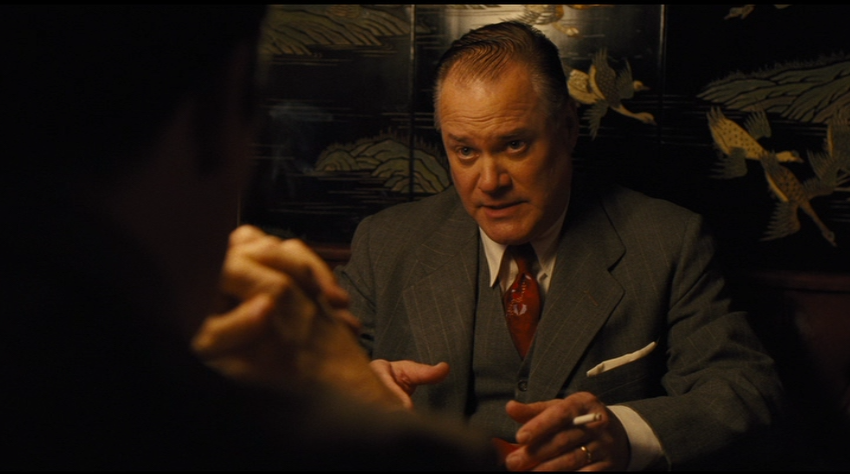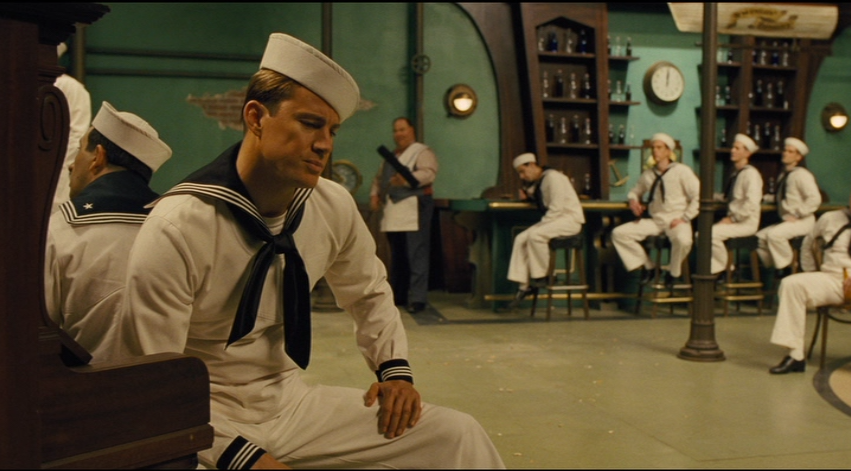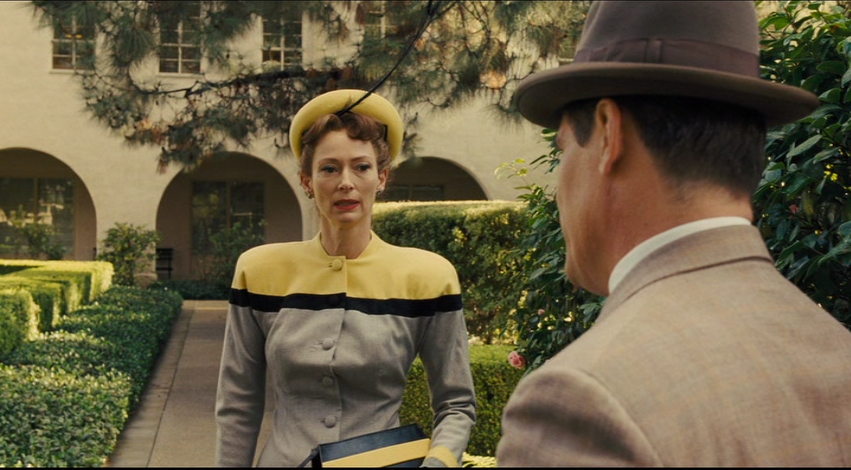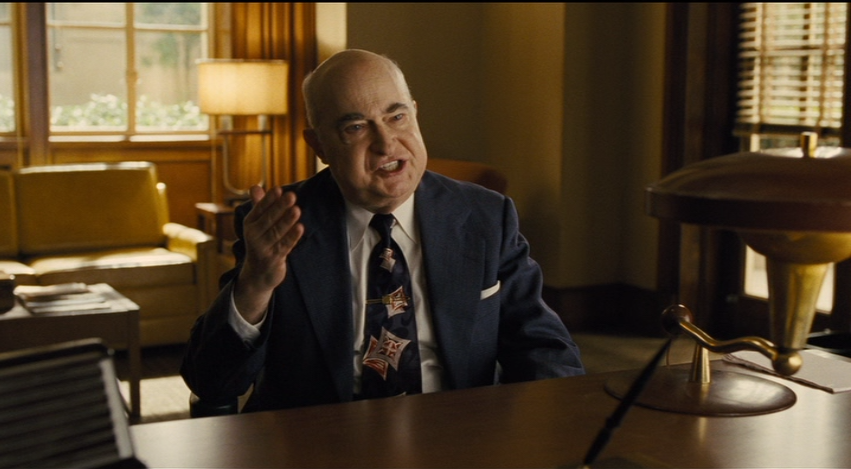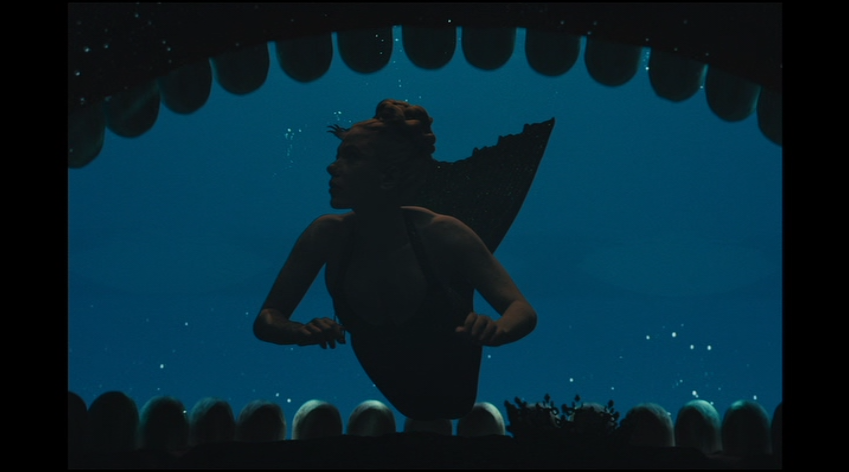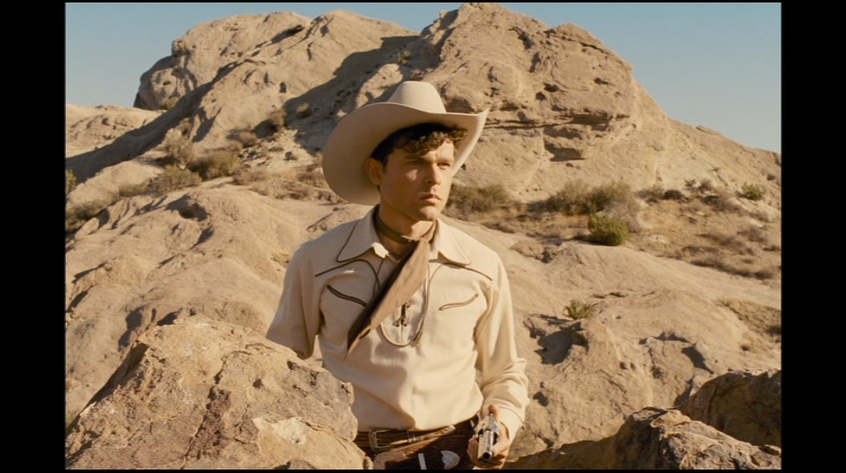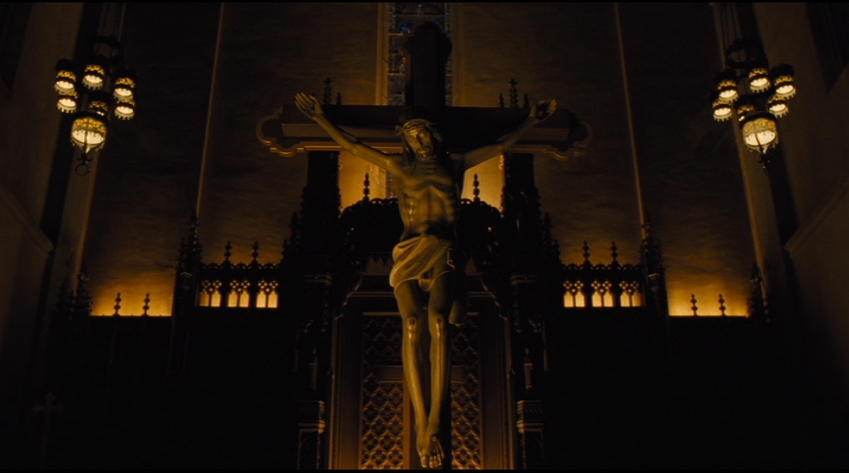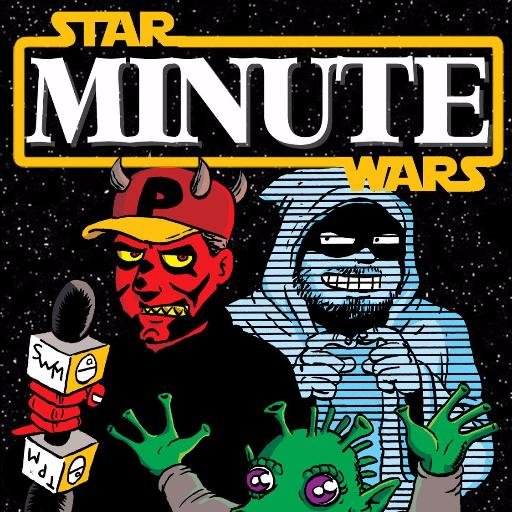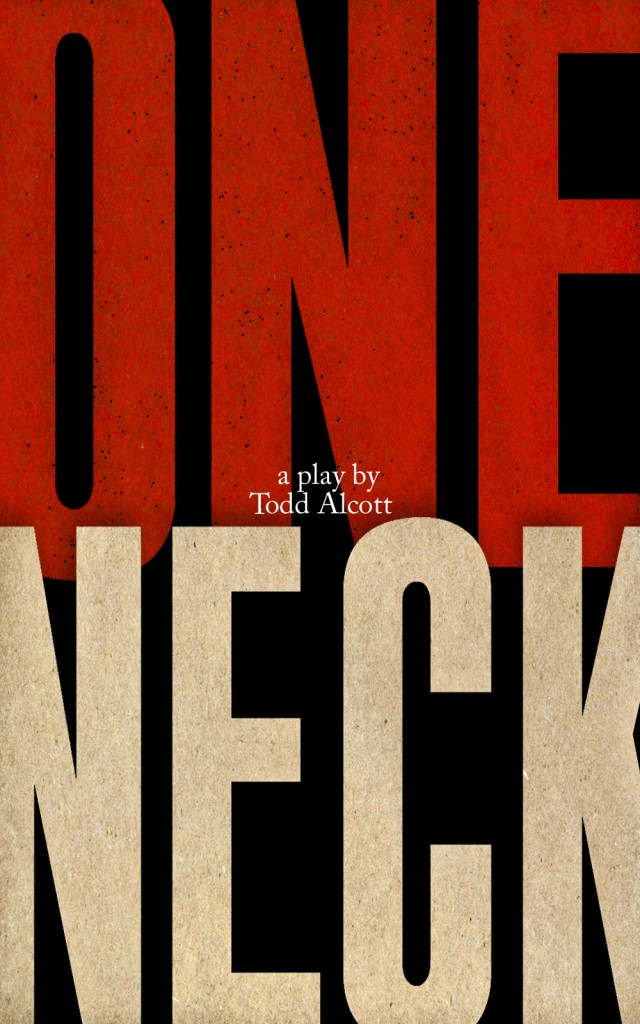Hail, Caesar! part 7
Eddie heads back to the Chinese restaurant to meet, for a second time, with Cuddahy, the man from Lockheed. What has changed in Eddie’s life in the past six hours? He’s had to deal with a director throwing a hissy fit, he’s had to pay ransom for a kidnapped movie star, figure out a solution to a pregnant mermaid problem, fend off fights from two gossip columnists, and save the life of an editor who was almost killed by her own Moviola. That has involved a lot of running around but nothing that Eddie would call “physical culture.” Cuddahy offers Eddie a contract of ten years, with stock options. He’s essentially offering Eddie a chance to be “set for life,” a sense of permanence in a world full of craziness. He also offers Eddie a set of airplane gifts for his children — he knows that Eddie’s 27-hour days leave him no time to be a husband and father, and that wracks him with guilt.
Hail, Caesar! part 6
At the half-way point of the narrative, Hail, Caesar! introduces a new major character, Burt Gurney, seen on the set of a service-comedy-musical, performing a long, complex tap routine with a group of sailors, to a song called “No Dames.” In the context of the number, Burt and his crew are going to sea for eight months and will be without women and with little to do. Gay joke aside, the number is nevertheless a piece of foreshadowing for Burt’s eventual fate, a sunny Hollywood version of a story that hasn’t happened yet. There is no biblical subtext to the number that I can divine, but Hail, Caesar! doesn’t seem to be that adamant about laying on the Christian symbolism too heavily. Hobie Doyle’s movie, for instance, has no biblical subtext either, beyond a kind of Manichean good-guy-bad-guy reading of human interactions. Like Hobie’s movie, and DeeAnna’s mermaid picture, the “No Dames” sequence relishes the pure visual joy of bodies in motion, shifting patterns and colors.
(Also like the other movie-within-a-movie scenes, “No Dames” is presented as though being shot in sequence, live on a soundstage. In this way, Hail, Caesar! becomes a movie about itself, a movie that lies to us about how movies are made while on the way to telling us about how movies lie to us.)
Hail, Caesar! part 5
After Eddie collects the $100,000 in ransom, before he can make it back to his office he runs into Thora Thacker’s identical twin sister Thessaly, who, like her sister, intends to run a story on Baird Whitlock, this one about his current disappearance. Eddie asks both sisters “What kind of a name is _____?” Well, “Thora” is, of course, a Scandinavian name, the female version of Thor. “Thessaly,” on the other hand, is a city in Greece. Both civilizations, and names, predate Christianity. Perhaps the Thacker sisters (“Thacker” being a corruption of “Thatcher,” or “the guy who builds roofs” in Old English, also derived from the Norman) are meant to be reactionaries, students of “the old ways,” predating even Caesar’s Rome, who are resistant to both Mr. Schenck’s Capitol and to the message of Jesus.
Hail, Caesar! part 4
Eddie Mannix meets with the producer of Hail, Caesar! ATOTC to discuss the crisis of Baird Whitlock’s disappearance. The producer is, if anything, even more passionate about the project than Eddie. He’s not prepared to “shoot around” Baird, the “heart of the movie” depends on Baird’s face, his star power. And so a ticking clock is installed in Hail, Caesar!: Eddie must find and recover Baird Whitlock by tomorrow morning or else his tale of the Christ is forfeit. (I find it hard to believe that a project the size and scope of Hail, Caesar! ATOTC hasn’t already been beset by massive delays and cost overruns, but apparently Eddie Mannix runs a pretty tight ship.)
Hail, Caesar! part 3
Eighteen minutes into Hail, Caesar! we are treated to a water ballet number from another one of Capitol Pictures’ production slate, Jonah’s Daughter. The sequence is quite long and involved, with dozens of synchronized swimmers, a mechanical whale and Scarlett Johansson in a mermaid outfit. Hail, Caesar! takes care, when presenting its movies-within-the-movie, to present the finished product, as though complex sequences like the one shown here or the shootout in the Hobie Doyle movie are shot live by multiple camera. The Coens are careful to save their “cutting to reality” jokes for key moments; they otherwise give these Technicolor spectacles their due, letting us luxuriate in the tactile thrills of their sumptuous production values. Which makes me think that the title, Hail, Caesar!, isn’t meant ironically; the Coens really intend their movie to be a heartfelt salute to “capital” and the colorful fantasies it provides for the people.
And although the title of the mermaid picture is only fleetingly mentioned in an earlier scene, the whale is very much present, and we are reminded that the tale of Jonah and the whale is, like Hail, Caesar! ATOTC, also from the Bible, although from the Old Testament, the one with the “angry God” mentioned in the scene with the religious leaders. So an examination of the story of Jonah is in order.
From Wikipedia:
Jonah is the central character in the Book of Jonah. Commanded by God to go to the city of Nineveh to prophesy against it “for their great wickedness is come up before me,” Jonah instead seeks to flee from “the presence of the Lord” by sailing to Tarshish. A huge storm arises and the sailors, realizing that it is no ordinary storm, cast lots and discover that Jonah is to blame. Jonah admits this and states that if he is thrown overboard, the storm will cease. The sailors try to dump as much cargo as possible before giving up, but feel forced to throw him overboard, at which point the sea calms. The sailors then offer sacrifices to God. Jonah is miraculously saved by being swallowed by a large whale-like fish in whose belly he spends three days and three nights.[3] While in the great fish, Jonah prays to God in his affliction and commits to thanksgiving and to paying what he has vowed. God commands the fish to spew Jonah out.
How extraordinary that Eddie Mannix is producing a movie inspired by this story. Jonah is told by God to go preach to Ninevah, but doesn’t think he’s up to the task and flees from God’s command. God answers his reluctance with a storm, but then offers him salvation with a whale. In Eddie’s world, we see no indication of his fleeing from his God’s (Mr. Schenck) command, but we do see him terribly worried about disappointing Jesus (even though he doesn’t know a lot about Jesus). I think Eddie is a man who feels that he should be devoting more attention to God, but instead spends his time in activities of desperately earthly nature, even though he himself has only one vice, cigarettes.
Hail, Caesar! part 2
If Nick Schenck is the “capital” of Hail, Caesar!, I think Hobie Doyle, the singing cowboy western star is it’s “little guy.” Hobie is naturally gifted: he can ride a horse and rope a steer, and he has effortless charm and slinky good looks. Hollywood has made him a star, but he has no affect whatsoever — what you see onscreen is exactly who he is. That’s an important distinction, because, alone among the actors presented in Hail, Caesar!, Hobie doesn’t put on airs, doesn’t wear a disguise, isn’t manufactured. He’s the genuine article. He feels lucky to be where he is, lucky to be in pictures, lucky to be famous, and lucky that he’s got people like Eddie Mannix looking out for him.
Hobie is unique among Coen Bros “little guys,” because later in the movie we’ll meet a group of people who believe themselves to be little guys but are not. In many ways, Hail, Caesar! is like a sequel to Barton Fink but told from the other side of the studio executive’s desk. That may, perhaps, signal a change in the Coens’ perspective; once critical of capital as Hollywood outsiders, now they have a more nuanced approach as Hollywood titans — capital, they seem to think now, is just as human as the little guy. (It’s worth noting that True Grit, the Coens’ first and, so far, only blockbuster hit, was also their first screenplay where “capital” is also the narrative’s protagonist.)
Hail, Caesar! part 1
Hail, Caesar! begins with the image of a crucifix. This is imn portant to note, even before we know anything about the story, because it defines the poles of the narrative: the movie is titled Hail, Caesar! but Jesus is the opposite of Caesar. (As the gospels say,”Render unto Caesar the things that are Caesar’s, and unto God the things that are God’s.”) The movie, we will soon learn, is about a protagonist constantly running from Jesus to Caesar and back again, forever unsure about which one he’s serving.
All Coen Bros movies are, on one level or another, an examination of capitalism. There is always a character who represents “capital,” that is, the guy with all the money, and there is generally a character who represents “the little guy,” that is, the working Joe who’s just trying to get by. And the story of Jesus, as it happens, begins with the character who represents “capital” maybe more than any other in history, Caesar, raising taxes. Caesar raises taxes, which necessitates a census, which brings Joseph and his wife Mary from Nazareth to Bethlehem, and there’s no room at the inn because everyone is in town for the census. The boy who is born in a manger because of taxes eventually grows up to be a threat to Roman peace in Jerusalem. That’s the so-called “greatest story ever told,” and the protagonist of Hail, Caesar! is a storyteller.
NAMCAR Night Race
It's here. The NAMCAR Night Race Trailer. #TVMA #NASCARonACID #slotcarracing #comedy
Posted by NAMCAR Night Race on Wednesday, June 22, 2016
When I was a young man in the 1990s, creating experimental theater pieces in downtown New York, John Leguizamo and his producing partner David Bar Katz, for no good reason, gave me a job working on their sketch-comedy show House of Buggin.’ The rest of the writing staff was honest-to-goodness sketch-comedy professionals, and I was some weirdo who was thrown into the mix. One of those professionals was Lance Khazei, who, I recently learned, has now created his own mind-bending piece of TV-land hysteria, NAMCAR Night Race.
NAMCAR Night Race is a show about people who are way too into slot-car racing. NAMCAR (North American Model Car Races), in the world of this seriously bent half-hour, is a kind of shadow-realm of NASCAR, but more intense, because the stakes are so very very small. Like The Wacky Races, there is a cast of more-or-less insane drivers who, for various reasons, can’t stand each other. All have the desperate need to prove themselves out on the track, except, of course, that they can’t fit on the track, and the track would fall down if they tried.
The comedy is presented in a mock-sports-show format, but then that’s where the real world ends. Like NASCAR crossed with “Too Many Cooks,” the race-car-driver narrative will take sudden, bizarre left turns. An interview will suddenly turn into a sketch, which will then turn into a commercial, which will then melt down and explode into a graphics assault, all without warning, before suddenly swinging back around to the sports-show format. There is a narrative in there, but it unfolds in a kind of impressionistic Bugs-Bunny dream frenzy. Like Monty Python or Mr. Show, it’s impossible to predict what’s going to happen from moment to moment, only that it’s going to be weird.
And yet, the show also bristles with humanity. While there are characters who might suddenly shoot lasers out of their eyes without warning or imagine themselves to be robots from the future, the struggles that the racers have are as simple and direct as can be. One racer, Scout, is a homespun tomboy Dixie Chick who wants to reclaim her father’s legacy. She also has eyes for likeable dude Manny, who only has eyes for Pit Girl, who is a man-eating succubus who also spends a lot of time thinking about Lego figures. You see what I’m saying – just when you think “Oh, I get what this show is,” that’s not what the show is. The co-hosts, D’Arcy Fellona and Theo Von, are as likely to bicker about who’s forgotten to take their meds as they are to describe the race unfolding, and every one of the characters is prone to hallucinations. Interviews devolve into digressions on Jenga and Paula Abdul, HO-scale figures on the track unexpectedly come to life, and third-prize winners in the race receive a year’s supply of ransom notes. It’s a demented spin around the NASCAR track and a breath of fresh air to comedy TV.
Star Wars Minute
For those of you who have enjoyed me analyzing screenplays, you can now LISTEN to me do so as I bloviate at length about various issues on the excellent podcast The Star Wars Minute here. The show was a ton of fun to do, the hosts are wonderful fellows, and at no point did they stop and say “Uh, Todd, we kind of need to wrap this up.”
One Neck finally available to own
It’s 1987. I’m standing in a bookstore on St. Mark’s Place in New York City. I pick up a book of writings by crazy people, titled Rants and Incendiary Tracts: Voices of Desperate Illumination, 1558 to Present. Being the young man I am, I think: hmm, looks interesting.
The book falls open to a selection titled “I Wish You All Had One Neck.” It’s a letter by Carl Panzram, a madman from the 1920s who was in prison and awaiting execution for the brutal, un-repented murders of almost two dozen men and boys on two continents. The letter is written to a kindly prison guard who took pity on the black-hearted maniac.
Panzram’s voice is savage, yet clear as a bell. “I have done as I was taught to do,” he writes. “I am not the least bit sorry. I have no conscience so that does not worry me. I don’t believe in man, God nor Devil. I hate the whole damned human race including myself. I have consistently followed one idea through all my life. I preyed upon the weak, the harmless and the unsuspecting.” To those who would wish to help him, he saves his most blistering attack: “The only thanks you will ever get from me for your efforts on my behalf is that I wish you all had one neck and I had my hands on it.”
Panzram’s mind on paper is chilling and unequivocal. And I think: if I can build a story around a character that strong, that absolute, that pure, I’ll really have something. I know some will love it and some will hate it, but I know everyone will respond to it.
I come up with an idea for a play as simple as a meat cleaver: a serial killer escapes from a mental institution and crashes a dinner party on Long Island. I take my character, my distillation of rage and misanthropy, and plunk him down in the middle of the cream of society – doctors, lawyers, stockbrokers, artists, media stars – and let him rip. The result is a dark comedy (“The mother of all black comedies” was the tag-line of the San Francisco production) that’s part The Man Who Came to Dinner, part Endgame and part Grand Guignol gorefest. By the end of the play we see that the killer is not a deviation from the norm, he is the purest expression of the norm. He’s not running counter to civilization, he is civilization, relentlessly, greedily pursuing death and destruction, conscienceless and remorseless.
I send the play out to agents. One responds with a phone call that says, and I quote, “This is the best play I’ve read in 17 years of being an agent, and I’m calling to tell you that I can’t represent you because it would be immoral.”
Now I know I’ve got something.
One Neck is available to purchase, for the first time, after 25 years, at the finest of online retailers.
